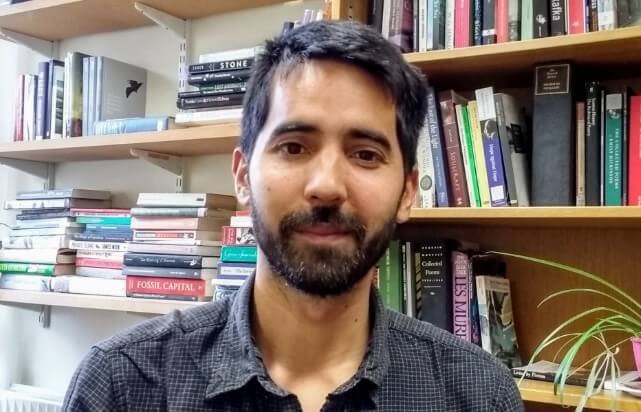Michael Malay: The Voice of Migration and Nature in Modern Literature

In the ever-evolving world of literature, where identity, belonging, and the environment intertwine, Michael Malay has emerged as one of the most distinct and compassionate voices of the twenty-first century. A British-Australian academic and author, Malay bridges the worlds of poetry, ecology, and human experience through his powerful reflections on migration, extinction, and the fragile connection between humanity and nature. His works — both scholarly and creative — offer deep insight into the interconnected lives of people and the natural world around them, capturing the invisible threads that bind existence together.
Early Life and Background
Michael Malay’s journey began far from the academic corridors of the University of Bristol, where he now serves as Senior Lecturer in English Literature and Environmental Humanities. Born in Jakarta, Indonesia, he experienced the realities of displacement early in life. His family later moved to Australia, a transition that would profoundly influence his understanding of migration, belonging, and adaptation. This personal history of movement across continents shaped his later writings, which often explore how both humans and animals navigate shifting habitats and the pressures of change.
In his youth, Malay developed a fascination with stories and the natural world — an intersection that would define his literary and academic pursuits. His formal education took him from the University of Queensland, where he completed his undergraduate studies, to the United Kingdom, where he earned his MA and PhD at the University of Bristol. His academic journey provided the foundation for a career dedicated to understanding how literature captures ecological and emotional transformations.
Academic Career and Contributions
As a scholar, Michael Malay focuses on the relationship between literature, ecology, and ethics. His research has centred on modern and contemporary poetry, with particular attention to writers who contemplate the place of the non-human in a changing world. Malay’s academic publications examine how poets use language to reimagine our connections with animals, landscapes, and the planet’s fragile ecosystems.
His first major academic work, The Figure of the Animal in Modern and Contemporary Poetry, explores how poets like Elizabeth Bishop and Raymond Williams engage with the animal world. Through this book, Malay introduces readers to the idea that animals in poetry are not mere symbols but participants in the shared drama of existence. By analysing literary representations of animals, he challenges readers to see them as fellow travellers in the story of life — beings with agency, emotion, and presence.
Malay’s academic contributions extend beyond his own publications. As a lecturer, he encourages students to see literature as a living dialogue between art and the environment. His courses at the University of Bristol bridge the humanities and ecological awareness, training a new generation of thinkers who understand that sustainability is as much a cultural and imaginative issue as it is a scientific one.
Transition to Creative Writing
While Malay’s scholarly work earned him recognition in academic circles, his transition into creative writing allowed him to reach a wider audience. His literary voice — intimate, reflective, and poetic — resonated deeply with readers who sought meaning in the natural world’s quiet resilience. This new phase of his career culminated in the release of Late Light, a book that blends memoir, ecology, and philosophy.
Late Light is not merely a nature book; it is a meditation on the fragility of life, the beauty of overlooked creatures, and the complex emotional terrain of belonging. Malay writes with empathy about the lives of animals often ignored or dismissed — eels, crickets, moths, and mussels — using them as mirrors to reflect human vulnerability and endurance. Each chapter becomes a small act of reclamation, reminding readers that life continues in unexpected corners, even as the modern world rushes towards extinction and loss.
The Themes of Late Light
The central theme of Late Light is coexistence — the idea that human life is inseparable from the broader ecological web. Malay’s prose blends personal memory with scientific observation and poetic description, offering a tapestry of thought that moves effortlessly between continents, species, and emotions. Through his reflections on migration, he draws parallels between his own journey from Indonesia to Australia and the migrations of creatures that cross oceans and continents.
The eel, for instance, becomes a symbol of persistence and mystery. Its long, perilous journey from the Sargasso Sea to the rivers of Europe echoes the author’s own search for belonging. The moth, meanwhile, stands for transformation — fragile yet enduring, drawn to light but vulnerable to destruction. In writing about these creatures, Malay urges readers to reconsider what it means to live meaningfully in an age of environmental crisis.
Literary Style and Philosophy
Malay’s writing style combines the lyricism of poetry with the precision of scientific observation. He neither romanticises nature nor reduces it to data. Instead, he crafts a language of attentiveness — one that acknowledges the beauty of life’s ordinary moments while confronting the profound sadness of ecological loss. His prose carries the rhythm of contemplation, inviting readers to slow down and look closer.
At the heart of Malay’s philosophy lies a belief in mutual vulnerability. He suggests that understanding the suffering of other beings can lead to compassion and, ultimately, renewal. The natural world, in his view, is not separate from human life but a reflection of it. Every disappearing species, every polluted river, is an echo of our own moral and emotional decay.
Recognition and Awards
Late Light was met with widespread acclaim and went on to win the 2024 Wainwright Prize for Nature Writing — one of the most prestigious honours in British literature. This recognition not only affirmed Malay’s talent but also marked a shift in contemporary nature writing. Where traditional nature writers often celebrated untouched landscapes, Malay explored the damaged and the forgotten — the places where nature survives in the margins of urban life.
His win symbolised the rise of a new generation of environmental writers who blend personal history with ecological awareness. Critics praised Late Light for its emotional depth and for bringing neglected creatures into the literary spotlight. The book reminded readers that beauty exists even in decline, and that hope often emerges from the very edges of despair.
The Broader Impact of Michael Malay’s Work
Beyond awards and accolades, Malay’s influence lies in how he has redefined the relationship between literature and the environment. His work shows that ecological awareness is not just about conservation — it is about storytelling, memory, and empathy. By connecting human experiences of displacement and loss with the struggles of animals and ecosystems, he builds a bridge between the personal and the planetary.
In classrooms, literary festivals, and online discussions, Malay’s ideas continue to inspire readers and students to think differently about their place in the world. His approach to teaching environmental humanities encourages interdisciplinary thinking — blending art, science, and ethics. In a time of climate anxiety and social fragmentation, his writing offers solace and perspective, reminding us that resilience is shared across all forms of life.
Michael Malay’s Influence on Modern Nature Writing
Malay belongs to a growing movement of writers who refuse to separate the human story from the ecological one. His contemporaries include authors like Robert Macfarlane, Helen Macdonald, and Kathleen Jamie — all of whom explore the emotional and moral dimensions of environmental change. Yet, Malay’s distinct background as a migrant scholar gives his work a perspective that feels global and deeply humane.
He writes not from the viewpoint of a detached observer but as someone who understands what it means to be uprooted. His sensitivity to displacement — whether human or animal — lends his writing a quiet universality. Readers from diverse backgrounds find themselves reflected in his work, not because he speaks of grand adventures, but because he finds meaning in the small, often unnoticed rhythms of life.
The Ethical Core of His Writing
One of Malay’s greatest strengths lies in his ethical vision. His writing is not a call for simple environmental preservation but for moral awakening. He asks his readers to look inward — to recognise the emotional and spiritual consequences of ecological neglect. His work suggests that healing the planet begins with healing our perception: seeing the world as alive, interconnected, and worthy of respect.
Malay also questions modern humanity’s obsession with progress and consumption. He portrays the contemporary world as one where people have lost the ability to pay attention — to truly see the lives unfolding around them. Through his books and lectures, he seeks to restore this lost attentiveness, reminding readers that literature can reawaken empathy in an age of indifference.
Legacy and Continuing Work
Although Michael Malay is still in the early stages of what promises to be a remarkable career, his impact on both academia and public literature is already significant. His combination of poetic imagination and scientific curiosity marks him as a voice uniquely suited to the challenges of our time. In an era dominated by ecological uncertainty, his writing provides not only awareness but also hope — the belief that storytelling can help rebuild the world.
Malay continues to teach, write, and advocate for a deeper engagement with the living world. His future projects are expected to further expand on the themes of coexistence, transformation, and resilience. Whether through essays, lectures, or future books, his message remains consistent: the smallest lives can illuminate the greatest truths.
Conclusion
Michael Malay represents a rare blend of intellect, sensitivity, and moral clarity. His life’s work — from his early academic research to his award-winning book Late Light — stands as a testament to the power of literature to change how we see ourselves and the planet. By bringing together the themes of migration, identity, and ecology, he reminds us that we are all part of a shared story — one that extends beyond species, borders, and time.



